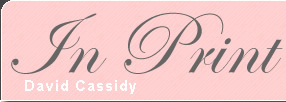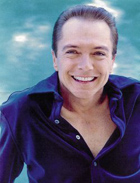
David Cassidy in the News
The 70's (Stayin' Alive) Won't Die (Stayin' Alive)
November 13, 1991
By Nick Ravo
New York Times
SICK of 60's nostalgia? Find peace signs and ponytails passe? Wish the Grateful Dead were dead? Perhaps then you will appreciate the next, and the most improbable, pop culture comeback: The 70's, the disco decade!
Perhaps not.
"It is 'Saturday Night Fever' all over again," said Andy Griggs, who works at the Roxy nightclub in the Chelsea section of Manhattan, which on Friday nights renames itself Disco Inferno.
No, the signs of a 70's revival may not be as obvious as, say, a white suit doing the hustle under a strobe light on a dance floor, but an array of artifacts have been mined from the Me Decade recently by marketers, the news media and other culture vultures.
Besides the resurgence of discos on the East and West Coasts, Hollywood has produced the cult film "The Spirit of '76 (Don't Pretend You Don't Remember)," starring, among others, David Cassidy. "The Real Live Brady Bunch" is playing off Broadway this season, as well as a 70's comedy of manners called "The Day They Stopped Making 'Ludes, or How Peyote Turned Me Into a Coyote."
Recently released books include "The 70's, From Hot Pants to Hot Tubs" by Andrew J. Edelstein and Kevin McDonough, and "One Is the Loneliest Number: The History of Three Dog Night." This month, Esquire magazine hailed Led Zeppelin's 20-year-old "Stairway to Heaven" as possibly the Greatest Song of All Time.
As for fashion, platform heels have yet to clip-clop their way into the mainstream (aside from a pair recently sported by Roseanne Barr on "The Arsenio Hall Show"). But college students have taken to Birkenstock sandals again. And businessmen who once modeled themselves after the slicked-back and suspendered Gordon Gekko are now wearing sideburns, wide lapels and spinnaker-size ties that recall the sartorial style of Don Cornelius on "Soul Train."
Then there is the Presidential bid of that 70's icon, Jerry Brown.
Some things, like polyester, never fade.
"Everyone has nostalgia for their childhood, their adolescence or their college days," said Billy Limbo, the impresario behind Club 1970 in Los Angeles, where patrons parade about in puka shells and leisure suits. "And now it's another generation's turn."
The 70's may be a most forgettable (and for many, regrettable) decade, but some aspects, particularly non-disco music, are being reconsidered.
"The culture that was the most visible was not representative of the best of the decade or even what the decade was about," said Gary Stewart, a vice president of Rhino Records in Santa Monica, Calif., which is selling two 15-volume sets of music from the decade called "Have a Nice Day" and "Didn't It Blow Your Mind." (The company is compiling a disco set that will run from two to five volumes; a title has not yet been selected.)
Cliff Chenfeld, an ex-corporate lawyer who was a founder of the Seventies Preservation Society, which says it has 130,000 members in North America and operates a toll-free phone line, (800) 666-1972, also noted that the decade was in many ways more 60's-ish than the 60's, as the environmental, gay liberation and feminist movements gathered steam.
"It really was an important decade and not just silly," Mr. Chenfield said as Isaac Hayes moaned his way through the soundtrack from "Shaft" in the background.
But academics remain puzzled by the 70's revival. They note that besides being an attempt to regain lost youth, a relived decade is supposed to recall a golden age, a time when life was more prosperous, innocent or spiritually fulfilling. And unlike past epochal reincarnations, like the 50's comeback in the early 70's or even the gay 90's in the Great Depression, the decade that was pockmarked by Peace With Honor, Watergate, the caretaker Presidency of Gerald R. Ford and the rejection of Jimmy Carter has few votes as America's belle epoque.
"It is really an unpleasant, often boring decade, and the sooner we forget it the better," said Jack G. Nachbar, a professor of popular culture at Bowling Green State University in Ohio.
Not surprisingly, many of today's 70's revivalists were pre-teen-age, if not toddlers, when "Charlie's Angels" was a prime-time hit. To them, Mary Tyler Moore was Mary Richards, not, as she was to the 60's generation, Laura Petrie. To them, the Bradys were the perfect family, not the Cleavers.
"We call it the decade of shame," said Fred Nelson of Chicago, who is 27 years old and won a Lava Lamp last summer in a best-essay contest organized by the Seventies Preservation Society. "We're making fun of the 70's, but we really secretly enjoy it."
For those who actually took part in the decade that taste forgot, recalling the 70's can be as painful as sitting through an est session. "It seemed like it went on forever," said Steve Tanenbaum, who wrote "The Day They Stopped Making 'Ludes."
"It was a blank period," he added, paraphrasing Richard Hell, one of the era's pre-eminent punk poets. "After the 60's, there was nothing left to do, and there was all this searching."
For others, of course, the 70's was a time of excess, involving experimentation with drugs or sex or both. Michael Musto, a nightclub critic for The Village Voice, said the decade is being resuscitated because this is a neo-Victorian age and the 70's symbolize a time "when you could be more reckless and excess was celebrated and encouraged."
"It is sort of an illusory fantasy, escapist," Mr. Musto said, adding that gay people were the among earliest 70's revivalists.
Dangers abound in reliving a decade rife with drugs and promiscuity. AIDS is the most serious, of course. But less threatening maladies exist, too. "You have to be in pretty good shape to disco, not to mention slam-dancing," said Jack Mingo, the author of the Whole Pop Culture Catalogue.
The 70's revival started in San Francisco and Los Angeles about three years ago, although isolated outbreaks were reported in New York in the mid-80's. Its kitschy appeal has helped it to spread to Miami and Washington and a vast number of college campuses.
"It's certainly making some sort of comeback," said Chris Meyers, 26, of Long Island City, Queens, who ventured into Disco Inferno last week. "It was a flirtatious time, and in the age of AIDS what else can you be?"
Unfortunately, the atmosphere of the three-month-old Disco Inferno falls far short of its anachronistic ambitions, principally because of New Yorkers' obsession for black party clothes. But the owners have tried to redo the decade of Studio 54 with a cavernous dance floor, a light-shattering mirrored ball, relentless disco tunes and slide shows featuring photographs of, uh, Devo?
Revivalists on both coasts are quick to explain that the decade was not defined by disco alone. " 'I Think I Love You" by the Partridge Family gets as big a scream as 'The Y.M.C.A.' by the Village People," Mr. Limbo said.
There are, for sure, limits to how much 70's schlock even today's retro-addled culture can absorb. For example, will mood rings ever make a comeback? "I don't see anyone making pet rocks again," Mr. Limbo said.
Mr. Musto also warned that the 70's were already an endangered decade. "I heard somebody had an 80's revival party just last week," he said.
